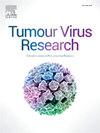Human cytomegalovirus UL82 promotes colorectal cancer cell proliferation through inhibiting the ubiquitination of OGDH via ANGPT2
IF 8.1
Q1 VIROLOGY
引用次数: 0
Abstract
Human cytomegalovirus (HCMV) infection and its association with tumorigenesis and tumor progression have garnered increasing attention. Previous research results have indicated that the detection rate of HCMV UL82 is higher in colorectal cancer (CRC) tissues and is correlated with poor prognosis in patients, yet the underlying mechanisms remain unclear. In this study, a cell model transfected with UL82 was established. Through in vitro and in vivo experiments, it was found that UL82 promoted the proliferation of CRC cells. Transcriptomic and metabolomic analyses revealed that UL82 could influence CRC glucose metabolism and cell proliferation by upregulating the key TCA cycle enzyme OGDH. Additionally, UL82 also affected CRC cell proliferation by upregulating the expression of ANGPT2, and silencing ANGPT2 resulted in a reduction in OGDH protein levels. Finally, through the investigation of the ubiquitin-mediated degradation pathway of OGDH, it was demonstrated that ANGPT2 inhibited the protein degradation of OGDH via deubiquitination, thereby maintaining its stability. In summary, UL82 promotes CRC cell proliferation by upregulating ANGPT2, which inhibits the ubiquitin-mediated degradation of OGDH, suggesting that targeting the UL82/ANGPT2/OGDH axis may offer a potential clinical strategy for the diagnosis of CRC.
人巨细胞病毒UL82通过ANGPT2抑制OGDH泛素化,促进结直肠癌细胞增殖
人类巨细胞病毒(HCMV)感染及其与肿瘤发生和肿瘤进展的关系已引起越来越多的关注。既往研究结果表明,HCMV UL82在结直肠癌(CRC)组织中检出率较高,且与患者预后不良相关,但其潜在机制尚不清楚。本研究建立了转染UL82的细胞模型。通过体外和体内实验,发现UL82促进CRC细胞的增殖。转录组学和代谢组学分析显示,UL82可能通过上调关键的TCA循环酶OGDH来影响结直肠癌的糖代谢和细胞增殖。此外,UL82还通过上调ANGPT2的表达影响结直肠癌细胞增殖,而沉默ANGPT2导致OGDH蛋白水平降低。最后,通过对泛素介导的OGDH降解途径的研究,证明ANGPT2通过去泛素化抑制OGDH的蛋白质降解,从而保持其稳定性。综上所述,UL82通过上调ANGPT2促进结直肠癌细胞增殖,而ANGPT2抑制泛素介导的OGDH降解,提示靶向UL82/ANGPT2/OGDH轴可能为结直肠癌的临床诊断提供潜在的策略。
本文章由计算机程序翻译,如有差异,请以英文原文为准。
求助全文
约1分钟内获得全文
求助全文
来源期刊

Tumour Virus Research
Medicine-Infectious Diseases
CiteScore
6.50
自引率
2.30%
发文量
16
审稿时长
56 days
 求助内容:
求助内容: 应助结果提醒方式:
应助结果提醒方式:


